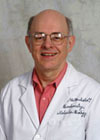
Professor Walter A. Scott, a researcher at the University of Miami Miller School of Medicine since 1975, passed away Jan. 28. A professor for biochemistry and microbiology, Scott was an exceptional developer in HIV/AIDS research funded by the National Institutes of Health.
“His first love was the laboratory,” his wife of 42 years, Dr. Gwendolyn B. Scott, said in a news release.
Scott suffered a hemorrhagic stroke at his home in Coral Gables and died later at Jackson Memorial Hospital, only four days before his 70th birthday.
Scott earned his bachelors degree from the California Institute of Technology and a doctorate from the University of Wisconsin in physiological chemistry in 1970. He met his wife in Wisconsin, and she then followed him to Miami in 1975. She is now a professor of pediatrics and is the director of the Division of Pediatric Infectious Disease and Immunology at the Miller School of Medicine.
“He always was very interested in scientific questions and stimulated by thinking about and teaching science, but he had a wonderful sense of humor. He laughed often,” she said. “He enjoyed life, and everyone who spent time with him liked him. I don’t think he would have said so, but he had a major impact on many people’s lives.”
Dean of the Miller School Dr. Pascal J. Goldschmidt agrees.
“Walter Scott dedicated his life to science, to this institution, and to advancing the careers of people across this country who continue to bring honor to both,” Goldschmidt said in the news release. “That is as much a part of his legacy as his contributions to unraveling the mysteries of biochemical mechanisms. Together with his wife Gwen they have transformed our ability to impact the AIDS epidemic.”
After completing his doctorate, Scott participated in a post-doctoral fellowships at the University of California, San Francisco and at Johns Hopkins University School of Medicine, where he worked with Nobel Prize winner Dr. Daniel Nathans.
In 1989, he and his wife primarily became involved in HIV research, focusing on the biochemical mechanisms of viral replication and antiviral drug resistance. In addition to directing his own molecular virology research laboratory since his arrival at UM, he also chaired the department’s Graduate Program Committee for 10 years.
“His lab never lacked eager Ph.D. students whose research he mentored with skill and wisdom,” said William J. Whelan, the professor who initially hired Scott, in the news release. “He ascended rapidly through the ranks to full professor, with tenure. And as far as I can recall, he has never been without external research support, a proud record.”
Scott joined the Miller faculty as an assistant professor and quickly elevated the department’s knowledge of recombinant DNA technology.
“He fulfilled our best hopes as a researcher, teacher and mentor,” Whelan said. “He was pivotal to our success in that regard. He led the change of direction of the Miami Winter Symposium to focus on gene technology, beginning with the 1977 event, which has continued to this day.”
In addition to his wife, Scott is survived by sister Nancy Koroloff, of Portland, and brothers Jerry and Gene, both of Seattle.
Memorial donations may be made to the Dr. Walter A. Scott Biochemistry Endowment Fund at the University of Miami Miller School of Medicine, P.O. Box 016960 (R-100), Miami, FL 33101.






